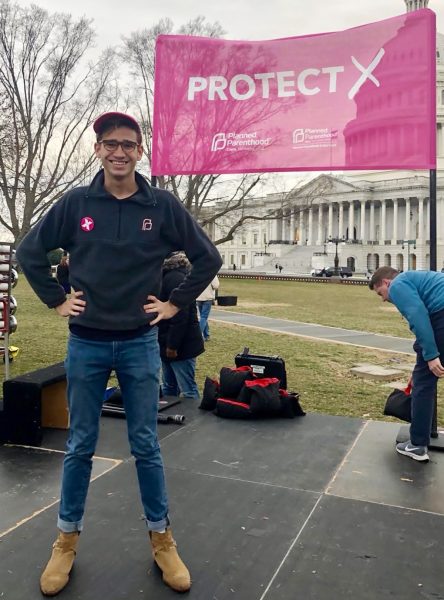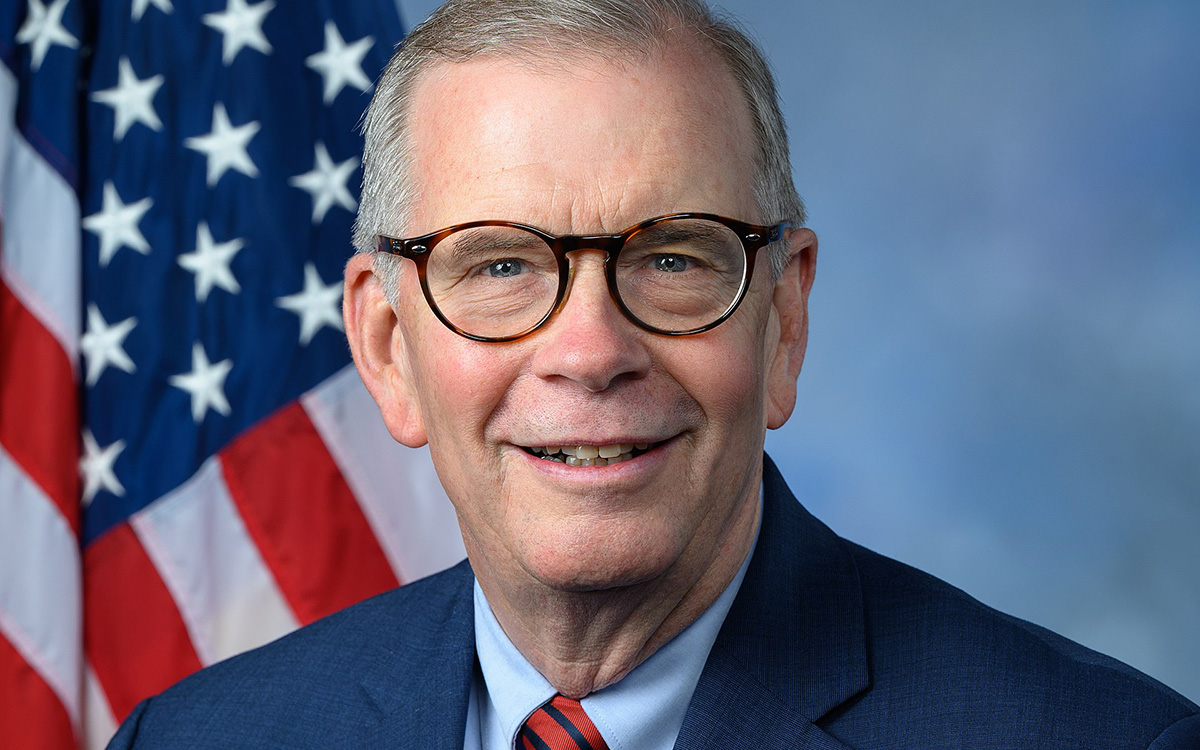Politics
Harris campaign’s LGBTQ+ engagement director on winning in November
Sam Alleman shares details of his personal and professional journey

Sam Alleman, national LGBTQ+ engagement director for the Harris-Walz 2024 campaign, talked with the Washington Blade last week for an exclusive interview about his work building and strengthening coalitions within the community in hopes of winning in November.
On the Democratic side, organizing LGBTQ voters for a presidential campaign goes back at least a decade, he said, to 2012 when Jamie Citron — currently the deputy assistant to the president and principal deputy director of the White House Office of Public Engagement — helped to lead these efforts on behalf of then-President Barack Obama’s reelection bid.
On Hillary Clinton’s campaign, Alleman said, it was Dominic Lowell working in close coordination with Sean Meloy, director of LGBT engagement for the Democratic National Committee, who now serves as vice president of political programs at the LGBTQ Victory Fund and Institute.
“Something that we’re very proud of as the little crew of folks who all are friends,” Alleman said, “is really building off each other’s work to continue scaling this and building out infrastructure to organize within the community.”
He added that in 2020, Reggie Greer, who led LGBTQ engagement for the Biden-Harris campaign and is now the State Department’s senior adviser to the U.S. Special Envoy to Advance the Human Rights of LGBTQI+ Persons, “was dealt the very difficult hand of a global pandemic.”
He explained, despite the challenges, Greer and others managed to build “a wonderful program that’s very much virtual, put forward from folks that did this work and were online,” which has shaped efforts through to this day as the Harris-Walz campaign seeks to “really get people back in person” as they focus their push in, especially, the seven battleground states.
The goal, Alleman said, is “not losing the virtual component, but complementing it” to “get people back on board, back to the event, back to the rally, back to the business that is a presidential campaign in 2024.”
“That’s a question and a piece of this work that is not necessarily unique to the LGBTQ+ portfolio,” he said. “But then it’s been something that we’ve worked through, and I think getting that from 2020 and rebuilding and fleshing that out has been a top priority.”
“We have wonderful working relationships with Liam Kahn over at the DNC right now,” Alleman said, referring to the committee’s director of LGBTQ+ coalitions, “and then, of course, my counterpart in finance, James Conlon, we work hand in glove as a team to execute on all of this work,” together with “my deputy, oh my gosh, he just started, I’m so excited, Cesar Toledo — who is like an absolute force and really runs the day to day of the organizing program.”

For his part, Alleman’s career has taken him from organizing work as a college student for then-Texas State Sen. Wendy Davis to campaign work for Clinton to the center of the reproductive rights movement at Planned Parenthood to the White House and, now, the Harris-Walz 2024 race.
“I started on the campaign in April of 2024,” he said, working on behalf of what was then the Biden-Harris ticket, while before that, “I was at the DNC for two and a half years. So I started over there as the LGBTQ coalitions director in October of 2021 and helped to manage all their LGBTQ+ programming through the midterm elections.”
Alleman continued, “I was also the regional coalitions director for the Midwest. We affectionately called it the “snow belt,” but [it was] our Great Lakes and Northeast states of Wisconsin, Michigan, Pennsylvania, and New Hampshire in 2022 as well, working in that pod in tandem with all of our state programming.”
When transitioning into the new role, Alleman said “it was keenly important” for him to facilitate the continued investment in building “infrastructure for our community at the DNC” which is something the organization has shown is a priority focus.
“At the DNC, the work is very infrastructure focused,” he said, through the vehicle of coordinating with “our state parties” and “making sure that they have the resources to do this work to mobilize voters.”
Alleman added that a few dozen state Democratic parties have LGBTQ caucuses, so at the DNC he was working to “make sure that they were getting organized” in coordination “of course, with the partners, too.”
Asked to compare his experiences working in similar roles for the committee and then the presidential campaign, Alleman said “The party has a bigger responsibility, I should say, to think about the totality of the ticket” which means considering questions like “how are we getting resources to [down-ballot] races, like city council members and state reps and state senators?”
He noted “there are a lot of LGBTQ state reps and state senators with big names [who are doing] amazing work in this moment.”
By contrast, “when we’re here on the presidential [ticket] it’s a lot of the same strategies and tactics, but really homed in on our battleground states, really homed in on [the question of] ‘how are we building out capacity to talk to those voters where we know our pathway to victory is?'”
In between the Clinton campaign and the DNC was a long stint at Planned Parenthood, Alleman said, an opportunity that found him via a friend who reached out after Trump’s victory in 2016.
Packed into the Javits Center, where the Clinton team had organized what they — and most Americans — expected to be a victory party, Alleman said “everything changed from that point on” as “things that had felt so certain and so set in terms of what I was planning on doing, just sort of all changed.”
“I feel like it was that way for so many of us, both in terms of work, our personal lives, everything that happened in 2016,” he said. “And so I got a call from a friend — a good friend of mine who’s still one of my best friends, actually, I just officiated her wedding.”
The personal is political

“Everything really just sort of clicked there,” Alleman said, adding, “I worked at Planned Parenthood for five or six years, doing various jobs,” starting with the Metropolitan Washington affiliate where he worked to “plan the logistics and busses for the Women’s March” in 2017 to protest Donald Trump’s election.
Reproductive rights, he said, is “a big part of my story and why I’m in the work.”
Alleman is a Texas native. In college, he worked for the campaign of then-state senator Wendy Davis, who famously held a 13-hour-long filibuster in 2013 to block legislation that would have imposed harsher abortion restrictions.
“I’m originally from Plano,” he said. “By virtue of being from Texas, these things that feel like very big issues now have sort of always been litigated, LGBTQ+ rights, reproductive rights, in our state based off just conservative extremists,” adding, “we would call them MAGA Republicans now.”
While he was always supportive of reproductive rights, Alleman said that as a young man who was grappling with his sexuality and on his own coming out journey, he did not fully understand “the totality” of those freedoms and how they intersect with other core American values.
“A very important part of my story, and a big part of why I do this work, is my sister,” Alleman said. Just seven months after getting health insurance coverage through the Affordable Care Act, he said his sister was “diagnosed with breast cancer at a Planned Parenthood health center via a breast exam.”
While she “is now cancer free and in remission and doing very well,” Alleman said, “I don’t know what my family would have done if we had not been able to access health insurance through the Affordable Care Act.”
“It would have bankrupted my family,” he said, “and I would have dropped out of college. I wouldn’t be sitting here today, right? Like, nothing that happened would have happened, would have been possible. She very well may not be alive, you know?”
Alleman continued, “And so, the importance of healthcare and access to affordable healthcare, and then the ability for us to have bodily autonomy and then control of our own decisions and destinies, has always just been something that has been critically important for me.”
“We talk about all the accomplishments that we’ve seen from the Biden-Harris administration,” he said, like “the Affordable Care Act and what that means, but my story is an example of the impact of that, [of] what this actually means for people to have access to health care and health insurance, what this actually means for people to be able to go to their Planned Parenthood health center and feel safe in accessing reproductive health care in its totality, from abortion to breast exams.”
He described falling “in love” with the work at Planned Parenthood as well as with the movement for reproductive freedom. “I moved up to the national office about six or seven months after starting at the affiliate on their political team,” he said, “and ended as their national political manager before moving over to the DNC.”
From there, Alleman said, “I worked at the DNC for two and a half years managing the LGBTQ coalition work” during which time “we were really proud of the Biden-Harris administration, but it always felt [like] it was so clear where we would probably be in terms of who we were running against, right, where we are today in 2024.”
So the focus remained, he said, on “what was at stake, not only in the work that we needed to get done politically to, you know, get infrastructure done, get the Inflation Reduction Act done, make sure that we help the Senate and House as best we could in the midterms, so that we can continue achieving things like the Respect for Marriage Act — but as well, to put us in as best a position as possible to take on what was the looming threat to our democracy, and what is the looming threat to our democracy, that is Donald Trump.”
Alleman added, “And we see now” from “Project 2025” what “things will look like should he win — though we have, I think, a pretty good plan to keep that from happening.”
Storytelling and organizing go hand-in-hand
“I consider myself first and foremost an organizer, and there’s nothing more powerful for an individual than knowing your story and being able to tell that and stand in its truth and what that means for you and your power,” Alleman said.
He sees this as an important part of not just his work and career but also a focus of the campaign.
“So storytelling is absolutely, to me, one of the most fundamental things we do as organizers — it’s helping people find their voice and how they want to use that to benefit their communities, to turn out voters, and really just participate in our democracy,” he said.
Storytelling is also an important element of communicating about our intersectional identities, Alleman said. “We talk about these communities sometimes in such different lanes, but in reality, we’re all creatures of narrative.”
He added, “We’re all sort of experiencing life in that more qualitative, narrative way. And those stories are where people not only are able to sort of synthesize all the things that they are, but also provide the actual emotion and the human aspect of these issues in life.”
Congress
Goodlander endorses Pappas’s Senate bid
Announcement puts gay congressman on the path to securing his party’s nomination

U.S. Rep. Maggie Goodlander (D-N.H.) on Thursday announced she will not run to represent her state in the U.S. Senate, endorsing gay U.S. Rep. Chris Pappas’s (D-N.H.) bid for the seat of retiring U.S. Sen. Jeanne Shaheen, putting him on the path to secure the Democratic nomination.
“We are in the fight of our lifetimes right now, of a moment of real crisis and challenge,” she said. “I feel humbled and grateful to so many people across our state who have encouraged me to take a look at the U.S. Senate, and after a lot of thought and conversations with people I love and people I respect and people who I had never met before, who I work for in this role right now, I’ve decided that I’m running for re election in the House of Representatives.”
When asked by a reporter from the ABC affiliate station in New Hampshire whether she would endorse Pappas, Goodlander said, “Yes. Chris Pappas has been amazing partner to me in this work and for many years. And I really admire him. I have a lot of confidence in him.”
She continued, “He and I come to this work, I think with a similar set of values, we also have really similar family stories. Our families both came to New Hampshire over 100 years ago from the very same part of northern Greece. And the values that he brings to this work are ones that that I really, really admire. So I’m proud to support him, and I’m really excited to be working with him right now because we’ve got a lot of work to do.”
Today in Salem @MaggieG603 tells @WMUR9 she is not running for U.S. Senate & endorses @ChrisPappasNH #NHPolitics #NHSen #NH02 #WMUR pic.twitter.com/W2CMrhRuIC
— Adam Sexton (@AdamSextonWMUR) April 17, 2025
“Maggie Goodlander has dedicated her career to service, and we can always count on her to stand up to powerful interests and put people first,” Pappas said in a post on X. “I’m so grateful to call her my friend and teammate, and I’m proud to support her re-election and stand with her in the fights ahead.”
Earlier this month, former New Hampshire Gov. Chris Sununu, a Republican, announced he would not enter the Senate race, strengthening the odds that Democrats will retain control of Shaheen’s seat.
Congress
EXCLUSIVE: Garcia demands answers on deportation of gay Venezuelan asylum seeker
Congressman’s correspondence was shared exclusively with the Blade

U.S. Rep. Robert Garcia (D-Calif.) is demanding answers from the Trump-Vance administration on its deportation of Andry Hernández Romero, a gay Venezuelan makeup artist who was sent to a prison in El Salvador in violation of a federal court order and in the absence of credible evidence supporting the government’s claims about his affiliation with a criminal gang.
Copies of letters the congressman issued on Thursday to Immigration and Customs Enforcement and CoreCivic, a private prison contractor, were shared exclusively with the Washington Blade.
Garcia noted that Hernández, who sought asylum from persecution in Venezuela over his sexual orientation and political beliefs, had entered the U.S. legally, passed a preliminary screening, and had no criminal record.
Pro-bono lawyers representing Hernández during his detention in the U.S. pending an outcome in his asylum case were informed that their client had been removed to El Salvador a week after he failed to show for a hearing on March 13.
Hernández’s family now fears for his safety while he remains in El Salvador’s Terrorism Confinement Center (CECOT), which has a well documented record of human rights abuses, Garcia said.
Additionally, the congressman wrote, while experts say Tren de Aragua does not use tattoos as identifiers, the “primary evidence” supporting Hernández’s deportation based on his supposed links to the transnational Venezuelan gang “appears to have been two crown tattoos labeled ‘Mom’ and ‘Dad,’ which are common cultural symbols in his hometown.”
The determination about his links to or membership in the organization was made by a CoreCivic employee whose criminal record and misconduct as a law enforcement officer led to his termination from the Milwaukee Police Department, Garcia wrote in his letter to the company.
Requesting a response by May 1, the congressman asked CoreCivic President Damon T. Hininger to address the following questions:
- What qualifications and training does CoreCivic require for employees tasked with making determinations about detainees’ affiliations?
- What protocols are in place to ensure that determinations of gang affiliation are based on credible and corroborated evidence?
- How does CoreCivic oversee and review the decisions made by its employees in such critical matters?
- What mechanisms exist to prevent and address potential misconduct?
- What is the nature of CoreCivic’s collaboration with ICE in making determinations that affect deportation decisions? Are there joint review processes?
- What background checks and ongoing assessments are conducted for employees involved in detainee evaluations, particularly those with prior law enforcement experience?
- What guidelines does CoreCivic follow regarding the use of tattoos as indicators of gang affiliation, and how does the company ensure that cultural or personal tattoos are not misinterpreted?
In his letter to Tae D. Johnson, acting director of ICE, Garcia requested answers to the following questions by May 1:
- Did ICE personnel independently review and approve the determination made by CoreCivic employee Charles Cross Jr. identifying Mr. Hernández Romero as a member of the Tren de Aragua gang?
- What evidence, beyond Mr. Hernández Romero’s tattoos, was used to substantiate the claim of gang affiliation?
- Under what legal authority are private contractors like CoreCivic permitted to make determinations that directly impact deportation decisions?
- What vetting processes and background checks are in place for contractors involved in such determinations? Are there oversight mechanisms to ensure their credibility and adherence to due process?
- What guidelines does ICE follow regarding the use of tattoos as indicators of gang affiliation, and how does the company ensure that cultural or personal tattoos are not misinterpreted?
Together with U.S. Rep. Maxwell Frost (D-Fla.), Garcia wrote to U.S. Rep. James Comer (R-Ky.) on Tuesday requesting permission to bring a congressional delegation to CECOT for purposes of conducting a welfare check on detainees, expressing specific concern for Hernández’s wellbeing. The congressmen said they would “gladly include any Republican Members of the committee who wish to participate.”
Hernández’s case has drawn fierce criticism of the Trump-Vance administration along with calls for his return to the U.S.
Influential podcaster and Trump ally Joe Rogan spoke out in late March, calling the deportation “horrific” and “a horrible mistake.”
Last week, California Gov. Gavin Newsom (D) sent a letter to Kristi Noem, secretary of the U.S. Homeland Security, which manages ICE, demanding Hernández’s immediate return and raising concerns with the right to due process amid the administration’s crackdown on illegal immigration.
Hernández “was denied the opportunity to defend himself against unsubstantiated allegations of gang involvement or to present his asylum claim,” the governor wrote. “We are not a nation that sends people to be tortured and victimized in a foreign prison for public relations victories.”
Immigrant Defenders Law Center President Lindsay Toczylowski, who is representing Hernández, has not been able to reach her client since his removal from the U.S., she told NBC News San Diego in a report published April 11.
“Under the Constitution, every single person has a right to due process, and that means they have a right to notification of any allegations the government is making against them and a right to go into court and prove that those allegations are wrong if that’s the case,” she said. “In Andry’s case, the government never gave us that opportunity. In fact, they didn’t even bring him to court, and they have forcefully sent him to El Salvador without ever giving us any notice or without telling us the way that we could appeal their decision.”
“CECOT, this prison where no one has ever left, where people are held incommunicado, is a very dangerous place for someone like Andry,” Toczylowski said.
In March, a DHS spokesperson posted on X that Hernández’s “own social media indicates he is a member of Tren de Aragua,” though they did not point to any specific posts and NBC reported that reviews of his known social media accounts turned up no evidence of gang activity.
During a visit to CECOT in March, Time Magazine photographer Philip Holsinger photographed Romero and reported that the detainee plead his innocence — “I’m not a gang member. I’m gay. I’m a stylist.” — crying for his mother as he was slapped and his head was shaved.
Congress
House Republicans advance two anti-trans education bills
Congresswoman Jahana Hayes, LGBTQ groups slammed the effort

Republicans members of the House Education and Workforce Committee advanced two anti-transgender bills on Wednesday, one that would forcibly out students in public elementary and middle schools to their parents and a second covering grades K-12 that critics have dubbed a “don’t say trans” bill.
More specifically, under the PROTECT Kids Act, changes to “a minor’s gender markers, pronouns, or preferred name on any school form or sex-based accommodations, including locker rooms or bathrooms” could not be made without parental consent, while the Say No to Indoctrination Act would prohibit schools from teaching or advancing “gender ideology” as defined by President Donald Trump’s anti-trans Jan. 20 executive order, Defending Women from Gender Ideology Extremism and Restoring Biological Truth to the Federal Government.
U.S. Rep. Jahana Hayes (D-Conn.), who was named national teacher of the year before her election to Congress, rose to speak out against the bills during the committee’s convening on Wednesday.
“Curriculum does not include teaching students to be something else. Curriculum does not include indoctrinating students to identify as gay or LGBTQ or other or anything. But federal law mandates that all students have civil rights protections,” she said.
The congresswoman continued, “I don’t really understand what the members of this committee think happens in schools, but my question is, what do we do with these children? The children who you are saying, on this committee, don’t exist, the children who are struggling with their identity and often times confide in their teachers and ask for support and help.”
“What we’re doing in this committee is focusing on a small population of students who are at a point in their life where they are struggling and school may, for many of them, feel like the only safe place or the only place where they can get support, or the only place where they can speak to a counselor,” Hayes said.
“And as a teacher, I don’t care if it was just one student that I had to reassure that they were important and they were valued and they belonged here,” she said. “I’m going to do it, and anyone who has dedicated their life to this profession will do the same. So the idea that you all feel okay with arbitrarily erasing, disappearing people, making them think that they they don’t exist, or they don’t have a place in schools, or the curriculum should not include them, or whatever they’re feeling should not be valued, considered, Incorporated, is just wrong.”
“So I will not be supporting this piece of legislation, as if that was not already evident, and I will be using all of my time, my agency, my energy, my advocacy, to ensure that every student,” Hayes said, “feels valued, respected, important and included in the work that I engage in on this committee.”
The congresswoman concluded, “when you are in a classroom and you are a teacher, and that door closes and a student falls in your arms and says to you, I am struggling, and I can’t go home with this information, and I need Help, you have a moral responsibility to help that child or you are in the wrong profession. I yield back.”
The Congressional Equality Caucus slammed the bills in an emailed statement from the chair, U.S. Rep. Mark Takano (D-Calif.), who noted that the legislation comes as “Donald Trump is illegally trying to dismantle the Department of Education and pass tax cuts for billionaires.”
“Extreme Republicans in Congress are trying to distract Americans by advancing cruel, anti-trans legislation,” said the congressman, who is gay. “School districts, teachers, and staff best understand how to draft age-appropriate, inclusive curriculums and craft policies that both respect the important role parents play in children’s education and the importance of students’ safety.”
“Yet, Republicans’ Don’t Say Trans Act would cut critical funding for schools if their teachers teach lessons or include materials that simply acknowledge the reality of trans peoples’ existence,” Takano added. “Republicans’ forced outing bill would put kids in danger by requiring schools that want to take certain steps to affirm a transgender student’s identity to forcibly out them to their parents — even if the school knows this will put the student’s safety at risk.”
The caucus also slammed the bills in a series of posts on X.
🚨BAD BILLS ALERT🚨
— Congressional Equality Caucus (@EqualityCaucus) April 9, 2025
Today, the GOP-controlled Education Committee is voting on two anti-trans bills: One to force teachers to out trans students if they want to take certain steps to affirm the students’ identities, and a “Don’t Say Trans” bill.
Here's why we’re opposed: 🧵
The Human Rights Campaign also issued a statement on Wednesday by the organization’s communications director, Laurel Powell:
“Instead of putting our dangerous President in check and tackling the American economy’s free fall, House Republicans showed where their priorities lie — giving airtime to junk science and trying to pass more anti-LGBTQ+ legislation.
“Forcing teachers to ‘out’ trans youth rather than supporting them in coming out to their families and demanding that schools ignore the trans students who sit in their classrooms is a craven attempt to distract people from economic disaster by vilifying children.
“Even as they fire people whose jobs were to make sure schools have the resources they need, the Trump administration and their allies in Congress continue to attack vulnerable young people to score points with the far right.”
-

 State Department4 days ago
State Department4 days agoHIV/AIDS activists protest at State Department, demand full PEPFAR funding restoration
-

 Brazil4 days ago
Brazil4 days agoUS lists transgender Brazilian congresswoman’s gender as ‘male’ on visa
-

 District of Columbia4 days ago
District of Columbia4 days agoCapital Pride wins $900,000 D.C. grant to support WorldPride
-

 Mexico3 days ago
Mexico3 days agoGay couple claims Puerto Vallarta wedding venue discriminated against them












